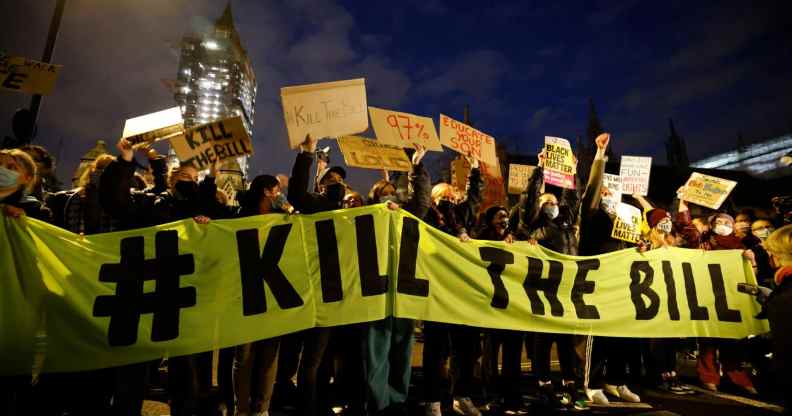Protesters arrested for rallying against ‘chilling’ anti-protest bill that would hand police sweeping new powers

Protestors gathered in Parliament Square to oppose the government’s policing bill (Tolga Akmen/AFP/ Getty)
Four people have been arrested while protesting a new policing bill which would grant police sweeping new powers to stifle peaceful protests.
Thousands gathered for a rally in Parliament Square on Monday (15 March) to oppose the Police, Crime, Sentencing and Courts Bill, which is due to be voted on Tuesday night (16 March), and against police mishandling of an earlier vigil for Sarah Everard.
The event was dominated by activists from the feminist group Sisters Uncut, whose Saturday vigil was interrupted by “disgraceful” heavy-handed policing.
The Metropolitan Police reportedly opted for a “hands-off” approach this time, but tensions remained high as protestors marched through Westminster and Lambeth chanting “All cops are b*****ds” and “Whose streets? Our streets”.
The huge crowds blockaded Westminster Bridge twice before massing outside the Metropolitan Police headquarters at New Scotland Yard.
The Met said its officers made four arrests, three for breaching coronavirus regulations and another for assaulting an emergency worker. Two others were handed fixed penalty notices.
In a statement published on Tuesday (16 March), the forces’s temporary deputy assistant commissioner Jane Conners said: “Despite many people adhering to officers’ instructions to leave the area and go home, we had to take some enforcement action as the evening progressed.
“Whilst I understand why people feel the need to express their views at this time, we must remember that we are still in the middle of a pandemic, and that there is the constant risk of transmitting the coronavirus.”
She added: “We will continue to review how we police events such as this and I would urge people to think carefully before joining any future protests.”
What is the Police, Crime, Sentencing and Courts Bill?
Condemned as “draconian” by experts across the political spectrum, the staggering 296-page bill includes a package of law and order pledges that critics say will drastically curb civil liberties in the UK.
If passed it would allow police to crack down on protesters if their actions are deemed to cause “serious annoyance” to the surrounding community, organisations and businesses.
Police would be able to dictate the times a static protest is allowed to start and finish, impose noise limits and disperse and convict protestors that flout these rules. It would also be a crime to fail to follow restrictions that protesters “ought” to have known about, even if they haven’t received a direct order.
“This will be the biggest widening of police powers to impose restrictions on public protest that we’ve seen in our lifetimes,” Chris Daw QC, a leading barrister and author, told The Big Issue.
“The bill hands over the power of deciding whether a protest is justified or should be allowed — decisions we as citizens have had for generations — directly to the home secretary [Priti Patel]. That’s an extremely chilling development. It’s completely contradictory to everything the liberty of the free citizen is about in Britain.”
Minorities and disadvantaged communities are likely to be affected the most by the policing bill, experts have warned.
Grace Bradley, director of human rights group Liberty, highlighted parts of the bill that will “facilitate discrimination and undermine protest, which is the lifeblood of a democracy”.
“They risk stifling dissent and making it harder for us to hold the powerful to account,” she said. “If enacted, these proposals would expose already marginalised communities to profiling and disproportionate police powers.”
It could have serious implications for the LGBT+ community, who have already been forced to cancel a major trans rights protest in London following threats from the police.

